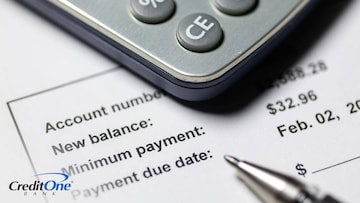
What Is an Outstanding Balance on a Credit Card?
December 20, 2023
Topics:
Credit CardKnowing what you owe on your credit card at any time is important. Learn all about what an outstanding balance is.

Introduction
Why did the man think his credit card issuer was paying him a compliment? Because when he looked at his account, it said he had an outstanding balance.
…
Anyways … dad joke aside, an outstanding balance is not a compliment. But it is something you want to understand. There are several “balance” terms — such as statement balance and negative balance — and you don’t want to confuse them.
An outstanding balance — also known as the current balance — is what you owe at the very moment you’re checking your account. It’s the sum of all purchases, cash advances, balance transfers, interest, and fees at that time. And it changes throughout the billing period, going up and down as more transactions are posted. It’s a living number.
So, how does an outstanding balance differ from a statement balance?
What Is the Difference Between Statement Balance and Outstanding Balance?
While your outstanding balance is the most up-to-date amount you owe on your credit card every time you check your account, a statement balance is what you owe at the end of a billing cycle. A statement balance is what you’ll see on your monthly billing statement and is what your minimum amount due is based on.
Your outstanding balance and statement balance are two different things, yet — because nothing in life is ever simple — can also be the same number. To clarify, let’s play with some numbers.
Say you spent $1,000 during your billing cycle. Your credit card statement will show your statement balance as $1,000. And, unless you’ve made another transaction, your outstanding balance will be $1,000 as well.
On the other hand, say you spent $1,000 during your billing cycle and $100 the day after your cycle ends. Your credit card statement will show your statement balance as $1,000. But if you log in to your account, your outstanding balance will be $1,100.
Should You Pay an Outstanding Balance?
On the list of important steps to take to build a good credit score, “making timely payments” is definitely toward the top. In fact, it’s one of the most important things you can do.
So, if you’re wondering if you should pay your outstanding balance, the answer is a resounding yes. If you can afford to do so, pay off that bad boy every time. Not only does it bring your balance down to zero, but it also means you’re avoiding interest and late fees, and freeing up credit for future purchases. Plus, paying your bill lowers your credit utilization ratio (CUR). All good things.
It’s never a bad idea to pay off your balance. Heck, pay it early if you can.
Bottom Line
Who knew there were different kinds of balances, right? Knowing what an outstanding balance is — and how it’s different from a statement balance — is important. But regardless of the type of balance, it’s key to manage your credit card responsibly and make payments on time, every time.
On that note, if you’d like a credit card designed to help you build your credit score when you make timely payments each month, see if you pre-qualify for an offering from Credit One Bank.



